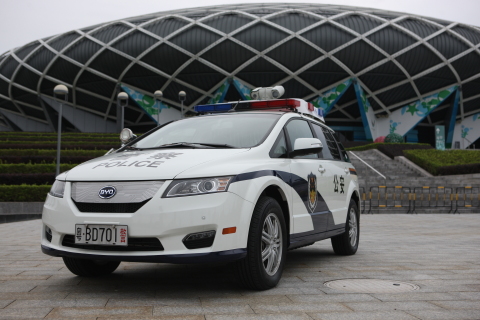Shanghai resident Qian Jun didn’t have to spend a single penny on a license plate for his newly-bought battery electric vehicle (BEV).
The electric car cost him 140,000 yuan (22,498 U.S. dollars) in total, including a vehicle purchase tax and car insurance. Normally, a domestic BEV costs buyers 200,000 to 300,000 yuan.
Shanghai is now offering financial subsidies for purchases of BEVs on top of central and local government funding, helping car buyers to save more than 100,000 yuan each.
The municipal government issued regulations to encourage private purchase and use of new energy vehicles at the end of last year. Free car plates for new energy vehicles are one of the incentives.
“The performance of this electric car matches that of a petrol vehicle with a 1.8-liter engine,” said Xu Weihan, who is in charge of BEV sales at Tzgev Limited, a company specializing in new energy vehicles.
Qian said his average daily commute is around 20 km, adding that he only has to charge his car’s battery once every four or five days. The monthly electricity bill for his car is about 60 yuan, far less than the money one normally pays for gasoline.
“I mainly charge the car at work, since there are charging posts near my company,” Qian said.
Shanghai now has over 1,000 charging posts, most of which are located in the city’s Jiading district, where Qian lives. The city is planning to build 50 battery switch stations with 5,000 charging posts over the next three to four years.
“Electric vehicle technology has become more mature and people now have to pay much higher prices for license plates. This has led to more people coming to ask us about electric vehicles,” Xu said.
The average bid for a plate in Shanghai soared to a record high of 75,332 yuan during a monthly auction that ended on Saturday, an increase of 5,986 yuan compared with last month.
“Environmental protection could be another reason for the popularity of electric vehicles,” Xu added.
Dangerous levels of air pollution in some Chinese cities have been blamed on increased vehicle emissions resulting from a greater number of cars hitting the streets in recent years.
Beijing to tighten vehicle emission regulations
Beijing is planning to implement a harsher emission standard for motor vehicles starting next month in an effort to curb the city’s air pollution, municipal environmental authorities said Wednesday.
The new Beijing V emission standard, which could be as strict as the Euro V emission standard used in Europe, will be adopted as of Feb. 1, said Fang Li, spokesman for the Beijing Municipal Environmental Protection Bureau.
The standard will be applied to new cars on the auto market and motor vehicles that have yet to receive license plates, Fang said, adding that vehicles currently in use will not be influenced by the new regulation.
As of Feb. 1, the sale and registration of diesel vehicles that cannot meet the new standard will be halted. Sales of substandard gasoline cars are to be stopped as of March 1, Fang said.
Municipal authorities have specified over 1,300 types of cars that meet the new standard and can cater to the demands of buyers with differing financial requirements, according to Fang.
Beijing has a permanent population of around 20 million and some 5.2 million vehicles, with the number of private cars still on the rise.
It is expected that the number of vehicles in the city will reach 6 million by 2015, said Li Kunsheng, director of the Beijing Municipal Environmental Protection Bureau’s vehicle management department.
Once the new standard goes into effect, it will help the capital cut nitrogen oxide emissions from vehicles by about 40 percent, Li said.
Beijing has seen frequent dense smog this month. Air quality hit serious levels on Wednesday, with smog blanketing the city.
The implementation of the new standard is expected to reduce automobile emissions, particularly fine particles that are known to be more hazardous, Fang said.


